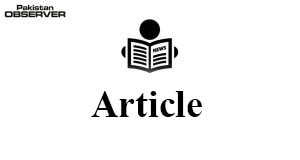A constitutional perspective on chasing no-confidence
PAKISTAN, being a post-colonial state, has inherited constitutional and institutional legacy from its colonial-masters — the British.
The Constitution of Pakistan, with some modifications, provides for parliamentarianism-the Westminster model.
The Constitution of 1973 has declared Pakistan as a Federal Republic consisting of the territories of federating units (Art.1).
The Federal Parliament consists of the President, representing the unity of the Republic, (Art.41); and, a bicameral federal legislature consisting of the National Assembly, and the Senate (Art.50).
The Constitution provides for a parliamentary system of government where the Cabinet is answerable to the Parliament of Pakistan [Art.91 (40].it is to say that the Executive and Parliament are sharing power with each other.
The Cabinet consists of ‘Cabinet of Ministers, with the Prime Minister at its head’, [Art.91 (1] to run the state apparatus.
The Prime Minister and his Cabinet can continue to hold the office until the confidence of the majority of the member of the House [Art.91 (5].
Not less than twenty per cent of the total membership of the Assembly can move a vote of no-confidence against a Prime Minister [Art.
95 (1] who would cease to hold the office if the resolution of no-confidence is passed by the majority of the total membership of the House [Art.95 (4].
In pre and post vote of no-confidence scenario, the government has three constitutional options to use: First, it can get disqualification, on the grounds of defection, of those members who ‘vote or abstain from voting in the House contrary to any direction issued by the Parliamentary Party to which he belongs, in relations to- a vote of no-confidence’ [63-A (1-B)].
A member may be ceased to be the member of the House if he/she votes contrary to the party lines on the grounds of defection.
Second, the Prime Minister enjoys the right to advise the President for the dissolution of the National Assembly.
The Article 58 reads that the ‘National Assembly shall stand dissolved at the expiry of forty-eight hours after the Prime Minister has so advised’, [Art.58 (1].
However, the Prime Minister can use this power before the submission of a resolution for a vote of no-confidence against him, [Art.58 (1].
It is to say that the government has lost this option since the requisition for the no-confidence has been submitted in the Assembly.
Third, the President can dissolve the National Assembly, if, in his opinion, after the passage of no-confidence vote, no other member of the Assembly is likely to secure the confidence of the majority of the members of the Assembly [58 (2-A)]; or, if the Federal Government is unable to continue in accordance with the constitutional mandate and an appeal to the election is considered necessary, [58 (2-B)].
In case of the dissolution of the Assembly, ‘a general election to the Assembly shall be held within a period of ninety days after the dissolution’ [224 (2)].
In national media, there has been an extensive debate over the number game required for a no-confidence move.
Some are of the view that the opposition is to win whereas some are of the view that the government is going to continue with the office.
Although the debate has generated a very useful insight among the political elite, what missing link, in this entire debate on the no-confidence move, is its impact on level of the good governance in and on the status of lives of the common men of Pakistan?
There is no, arguably, clue that what this no-confidence move would bring fruitful to influence the level of governance and welfare of the common people.
The parliamentary history of the country manifests clearly that it is not a matter of change of faces but of the reforms form within and continuity of the system.
The historical trajectory of Pakistan has manifested that we get nothing fruitful out of changes of the individuals.The tragedy of our country is that we have not strengthened the institutions.
And, we have become individual worshipers.It is imperative to strengthen the institutions of the country.Let the institutions grow and work in consistent with their constitutional role.
In democracy, Parliament is considered a supreme institution of the state.The strength of parliament is a key to institutional democratization.
A strong parliament can serve as a weightier overseer of the executive – the government.
The political parties and the stakeholders should bring constitutional reforms not only to strengthen Parliament but also increase the level of democracy in the country.
In addition, electoral reforms, freedom to the civil society and decentralization of power are of great importance.
If the political parties fail to strengthen Parliament, the people would soon consider it as a waste of their votes.
If, on the other hand, a strong parliament is established, the people will continue to trust on Parliament and democracy.
They, in return, would not be looking for an abrupt and artificial regime change where a historical disadvantage and structural fallacy is inherited in.
—The writer is a PhD research scholar on the Parliament of Pakistan at QAU, and Faculty Member at NUST.










